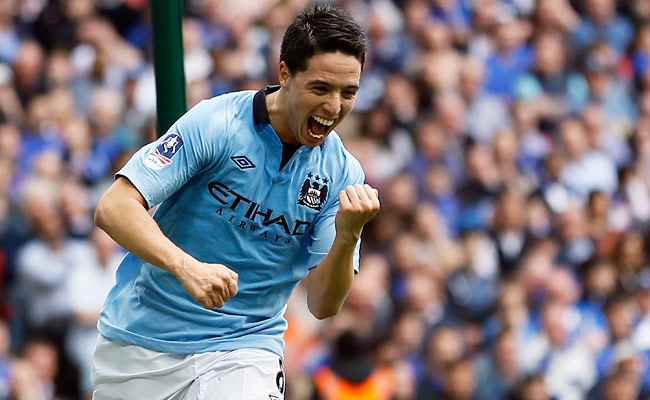After a topsy-turvy year, Samir Nasri says he has matured

Samir Nasri celebrates after scoring a crucial goal against Chelsea in their FA Cup semifinal match.
/AP
With a Manchester City possession stalling at the top of the box in a game against Newcastle United on March 30, Samir Nasri did what he often does: He improvised. The Frenchman drove into the heart of the Newcastle and as three defenders collapsed around him, Nasri slid a neat pass though a tight gap to David Silva. The Spaniard found the back of the net, scoring the second of what would become four Manchester City goals, all of which had Nasri's fingerprints on them.
"I was like 'boom'," Nasri told SI.com, his eyes widening at the memory of his man-of-the-match performance. "I said, 'I have to keep like this. I need to finish the season like this.' That's who I am -- that's how I should play, not have ups and downs all the time."
These ups and downs have been so frequent, however, that they raise doubts as to whether they can ever be stopped. In the last calendar year, Nasri finished the end of the 2011-2012 Premier League season a champion, participated in his first major tournament at Euro 2012 with France, and scored the equalizing goal there in a 1-1 draw against England. But each of those highlights arrived with a balance of bad.
His move from Arsenal to Manchester City paid off in silverware, but rightly or wrongly, the sizable bump in his salary became a target for critics, especially in his home country. That equalizing goal against England was matched with a show of arrogance -- a celebration involving a finger to his lips to shush those critics. Nasri came on as a substitute as France crashed out of the tournament with a 2-0 loss to Spain, and soon added more fuel to his self-made fire in the postmatch interview area.
The question from a French journalist was innocuous enough, according to a Reuters report. What did Nasri make of France's loss?
The response was astonishing, foul-mouthed and petulant.
"F--- you, go f--- your mother, you son of a b----," Reuters reported Nasri saying to the journalist. "F--- you, that way you can say I'm rude."
News of the tirade spread quickly, and for a France team still repairing its public image after a player-led mutiny at the 2010 World Cup (a squad Nasri did not make), it was the last thing it needed.
Nasri was exiled from the national team, subjected to widespread ridicule, and he says put in a mindset that wasn't in the right place for a title defense in the fall.
"I was very frustrated at the start of the [Premier League] season," Nasri explained. "I went through a difficult patch."
"Sometimes the pressure is very difficult, but that's the job, you know? Sometimes you have to be in the spotlight, and you have to deal with it. You have to do your job."
Nasri was not doing his job at the start of the season. Though he scored a goal and notched an assist in the opening game of the Premier League campaign, too often his performances were below par: predictable, inactive, and often bad-tempered.
Then came the game against Newcastle. Nasri's step seemed quicker than before, his movements more elusive, his imagination in overdrive. It wouldn't be a one-off performance -- Nasri cemented his place in Manchester City's starting eleven even as their title hopes slipped away, putting in a string of impressive displays to close the season, including a crucial goal against Chelsea in their FA Cup semifinal match.
What changed? Nasri inhales deeply through his teeth before answering.
"I opened my heart," he said. "I started to talk, started to deal with the problem with the journalist, and in my head I was better. That was the big change."
Nasri began giving interviews again. He apologized directly to the journalist, then apologized again for it having taken eight months for him to do so. In a wide-ranging discussion with The Times of London, Nasri spoke openly of the pressures that come with playing top-level soccer.
"From these kinds of experiences, you become better, you become more mature," Nasri said. "I'm still only 25. I still have a lot to learn and that's fine."
He is set to rejoin the French national team for the first time since his tirade for a pair of friendlies in June. (On Wednesday Nasri was forced to pull out of the squad due to injury, delaying his much awaited return.)
How he reacts to the disappointment will say a lot about how much he really has learned.





